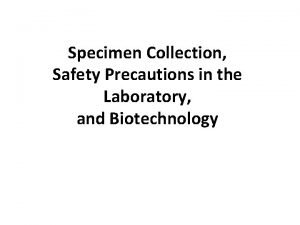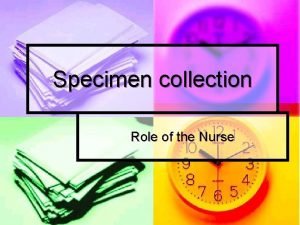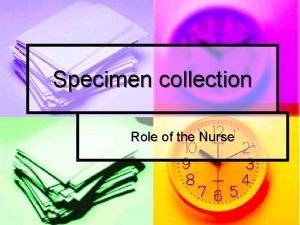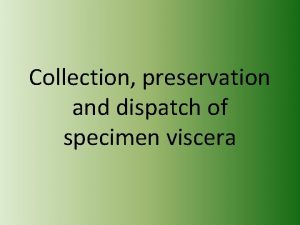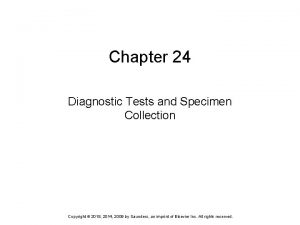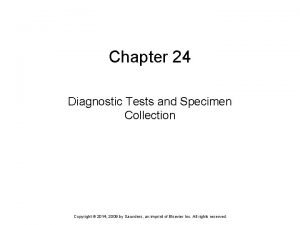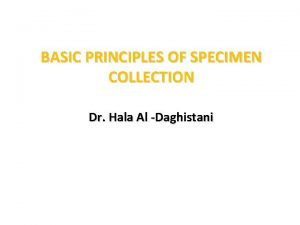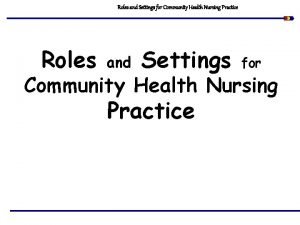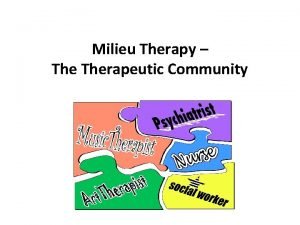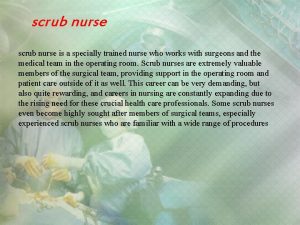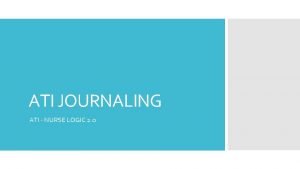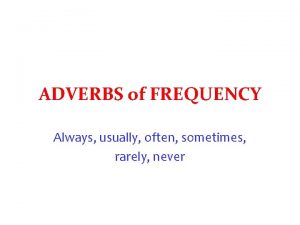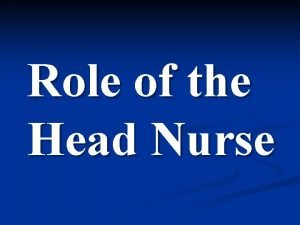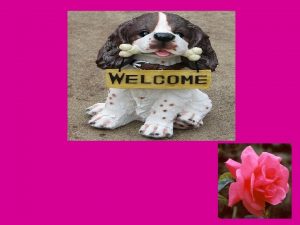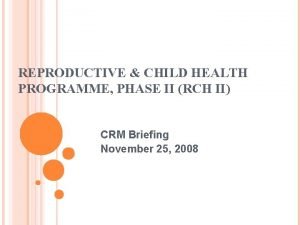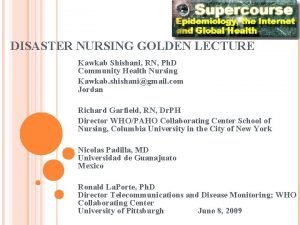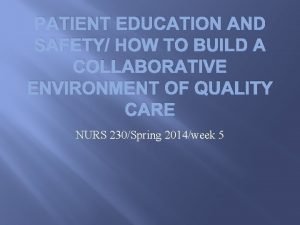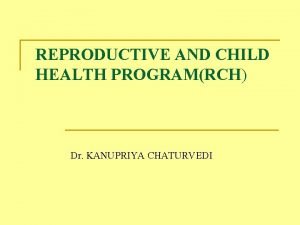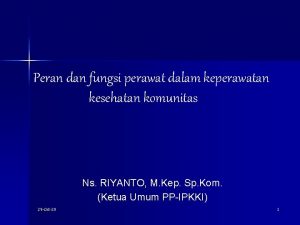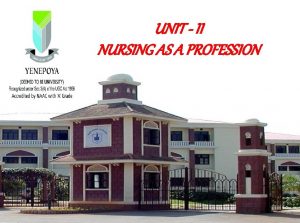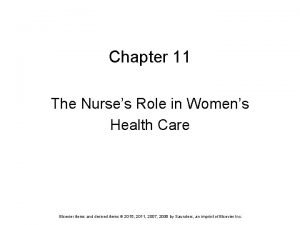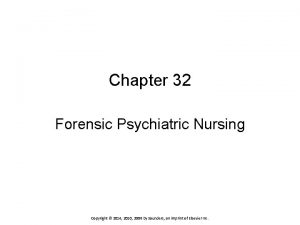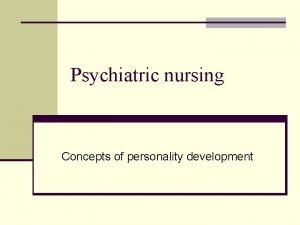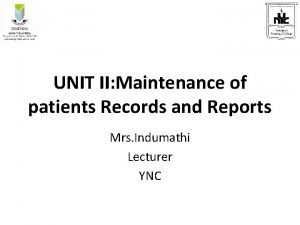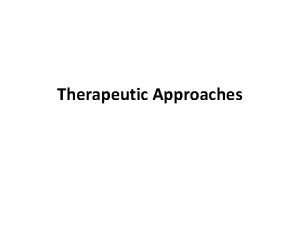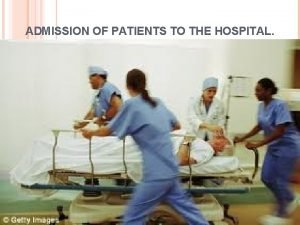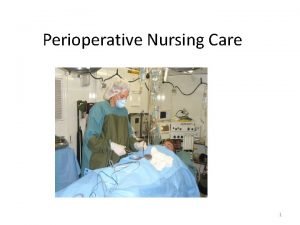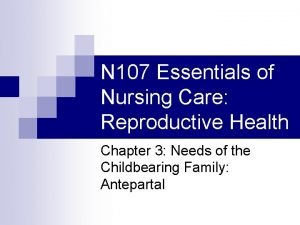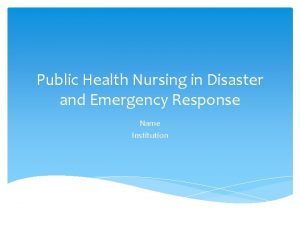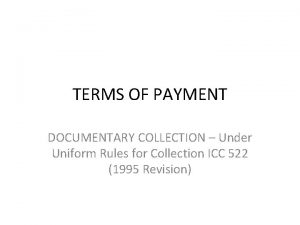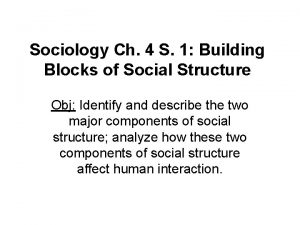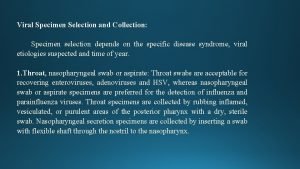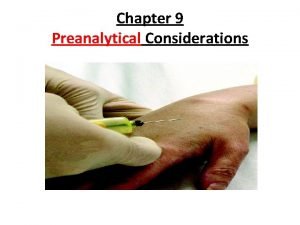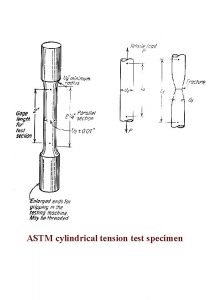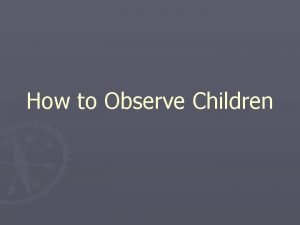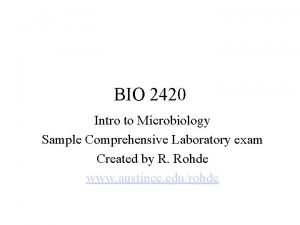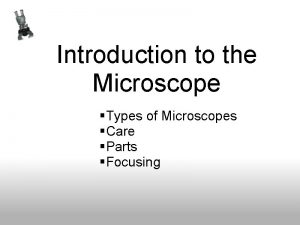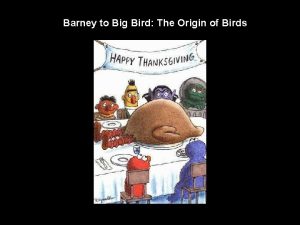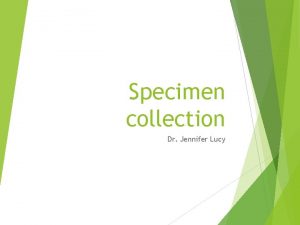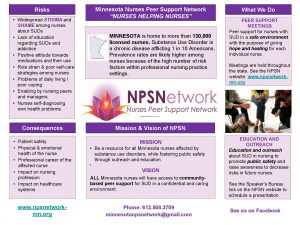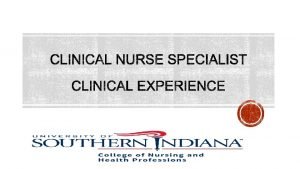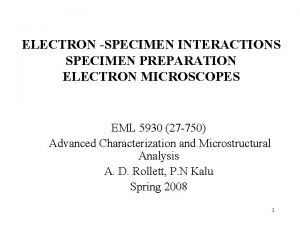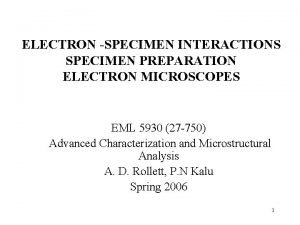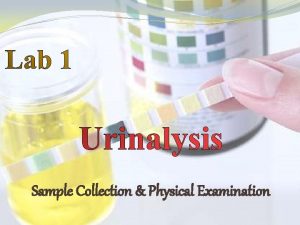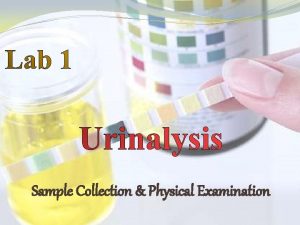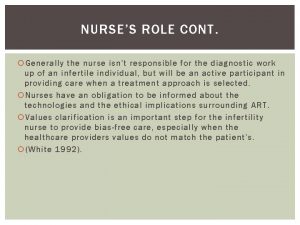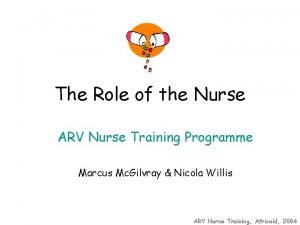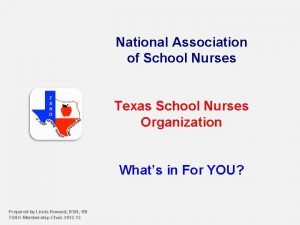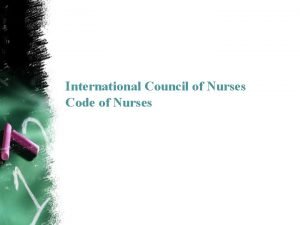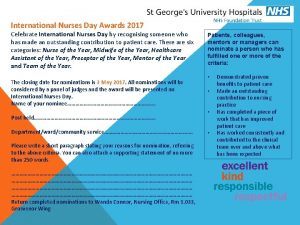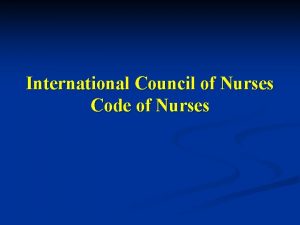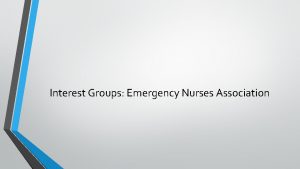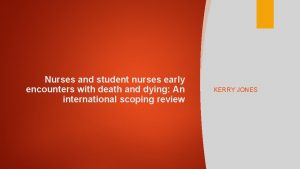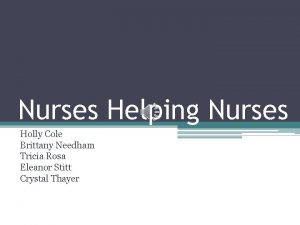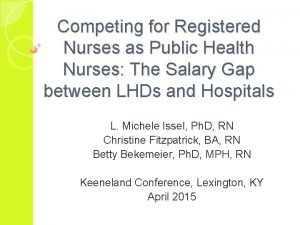Specimen collection Role of the Nurse Nurses often















































- Slides: 47

Specimen collection Role of the Nurse

Nurses often assume the responsibility of specimen collection n Specimens consist Urine l Stool l Sputum l Wound drainage l Blood l

What about the client? Comfort n Privacy n Questions n Clear, concise directions n l NPO

The Nurse Check physician orders n Keep it Simple directions to client n Standard precautions n Label specimen n Timely n C&S to lab ASAP or refrigerated n Documentation n

Respiratory Tract n Tests to determine abnormal cells or infection Throat cultures l Sputum specimens l Skin testing l Thoracentesis l

Nose, Throat Specimens n n n Upper respiratory/ throat infections Should Not be delegated Throat swabs l l l ac meal or 1 hr pc meal Wash hands, glove Tilt head backward “ah” ( if pharynx not visualized, tongue depressor, anterior 1/3 of tongue) Don’t contaminate

Throat cultures Oropharynx & tonsillar n Sterile swab n Culture determines pathogenic microorganisms n Sensitivity determines the antibiotics to which the microorganisms are sensitive or resistant n

Method for throat culture Insert swab into pharyngeal region n Reddened areas/ exudate n Gag reflex if client sitting and leaning forward slightly n Inform client re procedure n

Nose culture Blow nose, check nostril patency n Rotate Swab inflamed mucosa or exudate n Swab must advance into nasopharynx to ensure culture properly obtained n

Sputum specimens (3 major types) Ordered to identify organisms growing in sputum Ø C&S Ø AFB Ø 3 Ø consecutive, early am Cytology Ø Abnormal type Ø 3 early am lung cancer by cell

Sputum collection n n May be delegated Cough effectively Mucus from bronchus Not Saliva Record l l l Color Consistency Amount Odor Document date & time sent to lab.

Sputum collection No mouthwash/toothpaste- viability of microorganisms and alter culture results n

Skin testing n Determines pulmonary diseases Bacterial l Fungal l Viral l Antigen injected intradermally Injection site circled Instructions not to wash site

Reading skin test Induration – palpable, elevated, hardened area around site. Edema and inflammation from antigen –antibiotic reaction. Measured in millimeters n Reddened flat areas are neg. The elderly freq. display false neg. or false positive TB skin test n

If positive TB test Complete history risk factors n Symptoms n Weight loss l Night sweats l Hemoptysis l Fatigue l Early am sputum for AFB Chest xray

Thoracentesis Insert needle through chest wall into pleural space Aspirate fluid • Diagnostic • Therapeutic • Biopsy

SPUTUM COLLECTION Sputum containers

SPUTUM COLLECTION Isolated chambers for sputum expectoration

SPUTUM COLLECTION Sputum suction from lung

WASTE MANAGEMENT Be careful !

Gastric Secretions n NG tube

Gastric Secretions n NG tube

Cultures Culturette/swab n Wet/dry method n Nose, throat, wound n Review procedure manual & fill in requisitions.

WOUND SPECIMEN

Cultures Culturette/swab n Wet/dry method n Nose, throat, wound n Review procedure manual & fill in requisitions.

Nursing Functions for Specimen Collection Explain procedure, gain client’s participation 2. Collect right amt. of specimen at the right time 3. Place specimen in correct container 4. Label container accurately (addressograph), plastic bag 1.

Nursing Functions for specimen collection 5. 6. 7. Complete lab. Req. Place the specimen in the appropriate place for pick up. Document/record specimen sent and anything unusual about the appearance of specimen

Blood glucose levels Capillary Puncture n Reduces Venipunctures n Clients can perform n Glucometers n Chemical reagent strip n Delegated to those instructed in skill if client’s condition stable n

Glucose monitoring Ordered ac, pc, hs, fasting, before insulin (sliding scale) n ? Risks for skin puncture n Assess area of skin n l Sides of fingers, toes, heels Client’s ability n Normal fasting Bld. Sugar 70 -120 mg/100 ml n

Glucose Monitoring n n n Wash hands, glove Client wash hands, warm water Follow instructions on meter Massage /milk finger or puncture site Antiseptic swab ( allow to dry completely) Wipe away first droplet of blood with tissue/cotton ball

Glucose Monitoring Dispose of lancet in sharps container n Wash hands n Check puncture site n l Can share reading with client Record results n Proceed as indicated by results n

The Value of Measurement 3 benefits to measuring progress and results ü Shows where we are now ü Tells if we are heading toward our goal ü Allows us to make improvements along the way

INCENTIVE SPIROMETRY Incentive Spirometry is designed to mimic natural sighing or yawning by encouraging you to take slow, deep breaths. A device called an Incentive Spirometer is used to provide information about your inspiratory effort. When you lie in bed for a long time, after surgery, or if are having a lot of pain, you tend to take shallow breaths and not cough as often as needed. By inhaling deeply, you help mobilize secretions and open up areas of the lungs that may have become collapsed. Try to do at least ten breaths every hour on your Incentive Spirometer.

Incentive Spirometry Volume-dependant spirometer

Incentive Spirometry flow-dependant spirometer

Incentive Spirometry

Incentive Spirometry

Incentive Spirometry

Incentive Spirometry 1. Slide the yellow Patient Goal Indicator to the volume level (ml) prescribed by your clinician.

Incentive Spirometry With you lips off the mouthpiece, exhale completely. Then close your lips tightly around the mouthpiece. n n Inhale slowly. Keep the small yellow coach as close to the happy face as you can. n

Incentive Spirometry n n Inhale as deeply as you can. When you can't inhale any more, hold your breath for 6 seconds and note the highest level the top of the yellow piston reaches. Try to reach your prescribed goal. Repeat as many times as prescribed. Keep a record of your progress.

Bike Incentive Spirometry

Incentive Spirometry

Turn & Cough

Turn & Cough

Turn & Cough

Breath Deep and don’t Cough You have a choice !
 Safety precautions in blood collection
Safety precautions in blood collection Role of nurse in specimen collection slideshare
Role of nurse in specimen collection slideshare Nurses responsibility in collection of urine specimen
Nurses responsibility in collection of urine specimen Introduction of collection of specimen
Introduction of collection of specimen Chapter 23 specimen collection and diagnostic testing
Chapter 23 specimen collection and diagnostic testing Chapter 23 specimen collection and diagnostic testing
Chapter 23 specimen collection and diagnostic testing Four principles of specimen collection
Four principles of specimen collection Role of community health nurses
Role of community health nurses Therapeutic milieu
Therapeutic milieu Difference between circulating nurse and scrub nurse
Difference between circulating nurse and scrub nurse Nurse logic ati
Nurse logic ati Usually often sometimes
Usually often sometimes The head nurse
The head nurse Role of community mental health nurse
Role of community mental health nurse Role of nurse in rch phase 2
Role of nurse in rch phase 2 Nurse role in disaster management
Nurse role in disaster management Role of nurse in patient teaching ppt
Role of nurse in patient teaching ppt Nurses responsibility in sterilization
Nurses responsibility in sterilization Role of occupational health nurse
Role of occupational health nurse Role of nurse in rch phase 2
Role of nurse in rch phase 2 Tugas keperawatan komunitas
Tugas keperawatan komunitas Role of family planning
Role of family planning Definition of nursing by who
Definition of nursing by who Chapter 11 the nurse's role in women's healthcare
Chapter 11 the nurse's role in women's healthcare Role of psychiatric nurse
Role of psychiatric nurse Role of nurse in group therapy
Role of nurse in group therapy Principles of records and reports
Principles of records and reports Role of nurse in behaviour therapy ppt
Role of nurse in behaviour therapy ppt Admission types in hospital
Admission types in hospital Splint incision
Splint incision Role of nurse in reproductive health ppt
Role of nurse in reproductive health ppt Role of public health nurse in disaster response
Role of public health nurse in disaster response Landsat collection 1 vs collection 2
Landsat collection 1 vs collection 2 Documents against payment
Documents against payment Web role in azure
Web role in azure Krappmann symbolischer interaktionismus
Krappmann symbolischer interaktionismus Statuses and their related roles determine
Statuses and their related roles determine Specimen selection
Specimen selection Basal state blood collection
Basal state blood collection Specimen voucher
Specimen voucher Cylindrical tensile specimen
Cylindrical tensile specimen Specimen record observation
Specimen record observation Mayo setyembre 1888
Mayo setyembre 1888 Ddo specimen signature form
Ddo specimen signature form Identify specimen
Identify specimen When focusing a specimen you should always start with the
When focusing a specimen you should always start with the Identify the specimen
Identify the specimen Barney with muscles
Barney with muscles
